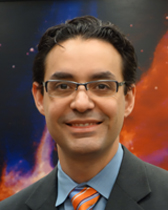Enectali Figueroa-Feliciano Named Associate Vice President of Research
April 9, 2024
Text taken from Research Communications by Matt Golosinski
The Office for Research at Northwestern University today (April 4, 2024) announced the appointment of two distinguished faculty members, Brian Mustanski and Enectali Figueroa-Feliciano, to associate vice president for research. These appointments come after a rigorous search to strengthen Northwestern's research enterprise. The leadership roles report to Vice President for Research Eric Perreault and are tasked with advancing innovation in the social and behavioral sciences and enhancing scientific collaborations with national laboratories. 
Figueroa-Feliciano, a professor of physics and astronomy who joined Northwestern from MIT in 2015, will serve as associate vice president of research focusing on national laboratories, a new position created to amplify Northwestern’s regional research profile further. With a distinguished career spanning over two decades, Figueroa-Feliciano brings a wealth of experience in experimental physics and collaboration with national research facilities, including NASA, Fermilab, and Argonne National Laboratory. His new role includes overseeing Northwestern URICs with extensive partnerships with national labs, such as the Northwestern-Argonne Institute of Science and Engineering (NAISE) and the Northwestern-Fermilab Center for Applied Physics and Superconducting Technology (CAPST).
Figueroa-Feliciano's research focuses on physics beyond the Standard Model, quantum computing, and experimental dark matter and neutrino searches. His contributions include leading groundbreaking projects such as the 10-year, $10 million Micro-X Sounding Rocket and the Ionization Measurement with Phonons atCryogenic Temperatures (IMPACT) experiment, which recently made a crucial finding important for dark matter searches. He is a faculty affiliate of the Center for Interdisciplinary Exploration and Research in Astrophysics (CIERA) and a member of the Executive Committee of the SuperCDMS experiment, an international 100-member scientific collaboration installing a dark matter detector in SNOLAB in Canada. His leadership roles at Fermilab and extensive involvement in international scientific collaborations underscore his ability to facilitate partnerships and advance research opportunities.
In his new role, Figueroa-Feliciano will play a pivotal part in strengthening Northwestern's relationships with national laboratories, expanding research opportunities for faculty, and fostering greater collaboration in team science. His expertise in experimental physics and quantum computing and his track record of securing significant funding for research projects promise to enhance Northwestern's position as a scientific innovation leader.
"I am excited to take on this new role for Northwestern and look forward to strengthening Northwestern’s collaboration with national laboratories to address high-impact research that benefits from the unique capabilities of university-national lab partnerships,” said Figueroa-Feliciano.
